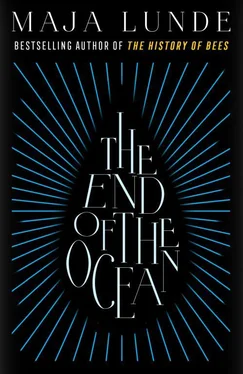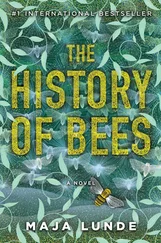The guard rummaged through a box on the ground. He pulled out a battered blue ballpoint pen with a broken plastic casing. “I want it back.”
I had to fill out the form standing up. I had nothing to lean the passport against. My handwriting came out wobbly and strange.
I tried to hurry. My hand shook. Occupation. Last place of work. Last place of residence. Where we had come from. Where we were headed. Where were we headed?
“The water countries, David,” Anna used to say to me. “That’s where we have to go.”
The drier our own country became, the more she talked about the countries in the north, where the rain didn’t just come once in a great while during the cold months, but also in the spring and summer. Where long-term drought didn’t exist. But where instead the opposite was true: the rain was an affliction, arriving in storms. Where rivers flooded over and dams burst, abruptly and brutally.
“What are they crying about?” Anna said. “They have all the water in the world!”
Where we lived we had only the salty sea, which was rising. That and the drought. That was our flood. Relentless.
First it was called the two-year drought, then the four-year. This was the fifth year. The summer seemed to be without end.
People had started leaving Argelès back in the autumn of last year, but we stayed put. I had a job to attend to; I couldn’t leave it, the run-down old desalination plant that converted the sea into fresh water.
But the power came and went, the stores were emptied of food staples and the city became emptier, quieter. And hotter. Because the drier the earth became, the hotter the air was. Previously the sun had applied its forces to evaporation. When there was no longer any moisture on the earth, we became the sun’s target.
Every day Anna talked about how we should leave. First straight up north, while it was still possible, before everyone closed their borders. Then she talked about different camps. Pamiers, Gimont, Castres. This one near Timbaut was the last.
As she talked, the temperature rose. Refugees from even further south passed through our city, stayed a few days, traveled on. But we stayed.
I stood there with the pen in my hand. Where were we headed?
I couldn’t answer this by myself. I had to find Anna and August first.
The man behind us in the line bumped into us, but didn’t seem to notice. He was tiny and shriveled, like he didn’t fill out his own flesh. There was a dirty bandage around one of his hands.
The guard quickly stapled the green form into his passport. The man accepted it without another word. He already had a pen in his hand and stepped aside to write.
It was my turn again. I gave the guard the passports and the forms with the ten pieces of information that were supposed to be everything he needed to know about Lou and me.
The guard pointed at the item at the bottom.
“And here?”
“We haven’t decided yet. I have to speak with my wife first.”
“Where is she?”
“We were supposed to meet here.”
“Supposed to?”
“Will. We have agreed to meet here.”
“We’ve been asked to ensure that something is written in all the fields.”
“I have to speak with my wife first. I’m looking for her. I said so.”
“Then I’ll put England.”
England, smack in the middle between south and north, still habitable.
“But there’s no guarantee it will be England where we…”
Anna didn’t like England. Didn’t like the food. Or the language.
“You have to put something,” the guard said.
“So we won’t be committed to it?”
He laughed a curt laugh.
“If you should be lucky enough to be granted residency, you must take whatever country you get.”
He leaned over the form and wrote quickly: “Great Britain.”
Then he gave me back my passport.
“That’s everything. At night you must stay here, but during the day you can come and go as you please, both inside and outside the camp.”
“Understood,” I said.
I tried to smile again. I wished he would smile back. I could have used a smile.
“You’ll be assigned a spot in Hall Four,” he said.
“But where can I ask about my wife? And my son? He’s just a baby. His name is August.”
The guard raised his head. Finally he looked at me.
“The Red Cross,” he said. “You’ll see them as soon as you enter.”
I wanted to give him a hug, but instead just mumbled, “Thanks.”
“Next please,” he said.
*
We walked quickly through the gate. I pulled Lou behind me. As soon as we were inside, I became aware of a sound. Crickets. They were sitting in a tree above us, rubbing their wings together feverishly. There was no water, but nonetheless they kept at it, as energetically as hell, staying the course. That was perhaps how one should approach this. I tried breathing more calmly.
The camp consisted of some huge old warehouses spread out across a flat field. Big trees cast shadows. They still had leaves; the roots must go deep. A sign on the wall informed us that the place had once been an awning factory. “Sunshades for all your needs,” it read. No doubt they’d done good business.
We continued walking through the camp. Between the buildings were a dozen or so military tents and just as many barracks. They were set up in straight lines and all of them had solar panels on the roof. There was no trash anywhere. People sat here and there, resting in the heat. Everyone was clean and wore clean clothes.
Anna had been right. This was a good place.
“There,” I said, and pointed at a flag that was flapping on the roof of a barracks a short distance away.
“What country is that from?” Lou asked.
“It’s not a country. It’s the Red Cross,” I said. “They know where Mommy and August are.”
“Do they?” Lou said.
“Yes,” I said.
Lou held my hand, with her dirty, sticky child’s hand. Anna used to nag her about washing her hands. The same ritual took place before every single meal. Remember to wash your hands, remember the germs . If she could see Lou now.
We turned a corner, and Lou came to an abrupt halt.
“A line,” she said softly.
Damn.
“We’re good at that,” I said, and tried to make my voice sound cheerful.
During the past year everything was rationed. We stood in lines for a gallon of milk. For a cut of meat. For a bag of apples, every other kind of fruit. The lines for fruits and vegetables were the longest. There were so few bees, so few insects. They had disappeared gradually, but when the drought came, the extinction rate accelerated. No insects, no fruit. I missed tomatoes. Melons. Pears, plums. Digging my teeth into a juicy plum. Cold from the refrigerator…
Lou couldn’t remember a life without lines. And she was the one who had come up with the idea that we could sit in line, instead of standing in line.
The first time she sat down, it was from sheer exhaustion. She was whining. On the verge of tears. But when I sat down beside her and said we were on a picnic, she laughed.
Sitting in line had now become routine for us. The lines were a place for games. Outings in the country. School. Dinner parties. There were especially a lot of the latter. Lou loved games about eating.
I gave Lou a cookie, the last one I had in my bag. She crunched on it and smiled.
“There’s like a yellow cream inside,” she said, and showed me the dry, grainy cookie.
We kept playing through the first course, the main course, dessert and cheese. For a few moments I managed to think only about the game.
But mostly I looked for Anna. Waited. She could appear at any moment. Walk towards me with August in her arms. He would smile with his mouth open, showing his four teeth. And she would hold him out to me so I could take him, hold him while she hugged me, and Lou would also join in. All four of us would stand like that, together.
Читать дальше










